-
Car Reviews
- All reviews
- Midsize SUVs
- Small cars
- Utes
- Small SUVs
- Large SUVs
- Large cars
- Sports SUVs
- Sports cars
- Vans
Latest reviews
- Car News
-
Car Comparisons
Latest comparisons
- Chasing Deals
The Toyota Corolla is one of those cars that can simply fade into everyday life, but with the current-shape’s driving flair, exterior presence, low running costs and comfy suspension, this hybrid Ascent Sport is more than just fit-for purpose
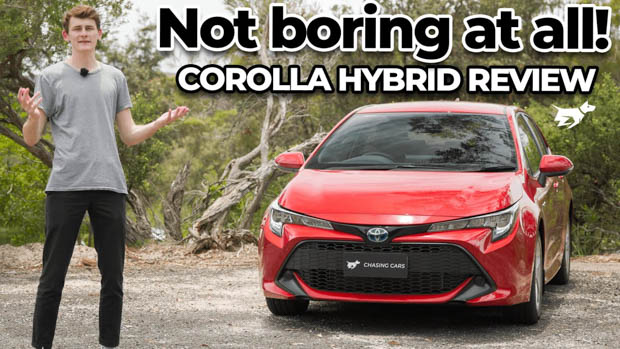
The Toyota Corolla has been part of Australia’s top 10 best-selling vehicles since at least 1999 (that’s as far back as digital records can be readily accessed) and in 2021, this small car continued to take the sales fight to SUVs, finishing in fourth spot overall in the Australia sales charts by shifting 28,768 units between January and December – ranking just behind the Toyota RAV4.
It’s no secret that the 12th-gen Corolla is good enough to deserve this success. Chasing Cars originally tested the Corolla range at its Australian launch in August 2018, we’ve also had a spin in the SX hybrid sedan ($30,795 plus on-road costs), sporty ZR petrol hatch ($33,645) and even conducted a base-model grudge match between a petrol Ascent Sport and Hyundai i30 ($25,490).
Every time we’ve driven a current-shape Corolla, it’s impressed us – but the further up the range you go the high-value experience gets a little diluted. So this base model Ascent Sport hybrid ($28,890 as–tested) should be the perfect Corolla, as it combines the hatch’s sharp looks with 16-inch alloy wheels shod in pillowy and high-profile 205/55-series Bridgestone Ecopia tyres.
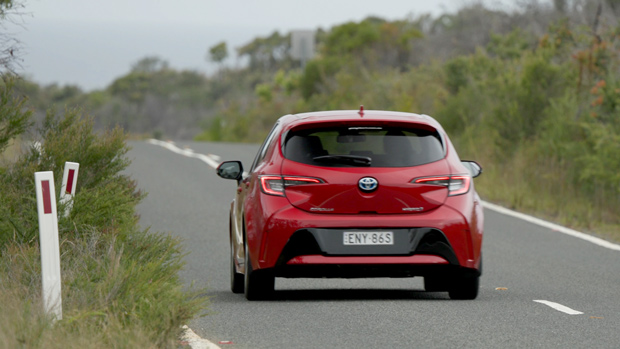
It’s not like the Ascent Sport misses out on exterior fanfare: painted Jasper Red ($495) and wearing five twin-spoke wheels, it’s quite handsome. You get both LED headlights and daytime running lights thrown into the package to bolster visibility, which isn’t the case for the rival Kia Cerato Sport Plus which is stuck with dimmer halogen units for its $33,490 driveaway price.
Toyota has been putting series-parallel hybrid systems in production cars for ages – 21 years in Australia after the first-gen Prius launched in 2001. In that time, the tech has come a long way, so far in fact that you no longer need to adjust your driving style with the fourth-gen hybrid powertrain in this Corolla.
Jump straight down into the Corolla, hit the start button and the dash lights up – but there’s no sound to accompany it, just a little ‘ready’ light illuminated in the analogue gauge cluster. How serene.

Pull away and for the first 100 metres or so (with gentle throttle inputs) the Corolla whispers down the street in electrified silence. Demand more pace and the 1.8-litre petrol motor will kick in – and while it’s perceptible, it isn’t exactly intrusive.
The near-seamless blend of low-speed electric running and higher-speed petrol punch makes the Corolla a killer urban runabout, with the dual electric motors powering the front wheels through the CVT transmission and adding a useful punch below 50km/h.
However, ask the Corolla to get up to freeway speeds and the total system power output of 90kW meant the Corolla only hit 100km/h in 11.5 seconds in our testing. Toyota doesn’t provide a torque figure: you get a strong hit of electric punch in urban areas but it tails off at higher speeds.
It would be nice to have the option of the 137kW 2.0-litre hybrid powertrain available in UK and European hatchs, but it seems that won’t happen for the time being. Still, the serenity and low fuel consumption afforded by the hybrid system makes this Ascent Sport a perfect urban companion that can manage occasional highway runs.
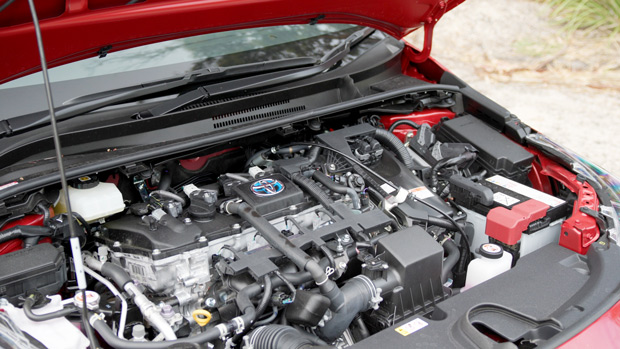
For those who like the size and look of the Corolla but want a beefier engine for extensive country touring, we’d recommend opting for the non-hybrid petrol, which uses a larger 2.0-litre four-cylinder to make 125kW of power and 200Nm of torque.
When it comes to ride quality, the Ascent Sport’s 16-inch alloys ands chubby 55-section tyres cushion the sharp-edged impacts and speed humps that litter the roads of Sydney’s inner west. The spring and damper settings deserve credit, with their supple tuning aided by the multi-link independent rear suspension design.
Out on country roads, the Ascent Sport’s grip levels are let down by its eco-friendly rubber. The Bridgestone Ecopia tyres squeal and protest even under light loads, and inspire little confidence in inclement weather.
That’s a shame because there is plenty of talent to the Corolla hatch’s chassis that is better unlocked in the sporty ZR range-topper with its 19-inch alloys and Dunlop Sport Maxx rubber, with hot hatch enthusiasts soon to be satisfied by the forthcoming AWD Corolla GR hot hatch that will likely make use of the Yaris GR’s 1.6-litre turbocharged three-cylinder engine and six-speed manual gearbox.
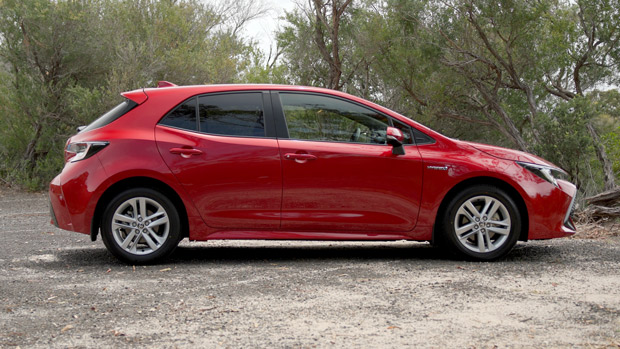
Instead, where the Ascent Sport shines brightly is in urban environments as the suspension cossets and the silent operation of the hybrid system soothes the driver – even the standard six-speaker sound system is better than expected.
There are some odd omissions from the Ascent Sport’s spec sheet, though. It may have a five-star ANCAP rating, AEB with pedestrian and cyclist detection, adaptive cruise control and lane-keep assist but the rear visibility is compromised and in base trim the Corolla hatch doesn’t have front or rear parking sensors.
This is the base model, but if you’re getting out of an older Corolla or another small car from a generation ago, this car feels pretty swish with its dramatic dash design, useful 4.2-inch TFT screen supplementing analogue dials, and classic-Toyota ice-cold dual-zone climate control.
Yes, the Corolla has scratchy cabin plastics at this lower end of the range, and the hard door tops are a little unpleasant to interact with – as is the oddly nickel-dimey plastic-trimmed steering wheel, but it doesn’t suck the moisture out of your mitts like a Toyota Hilux’s wheel does.
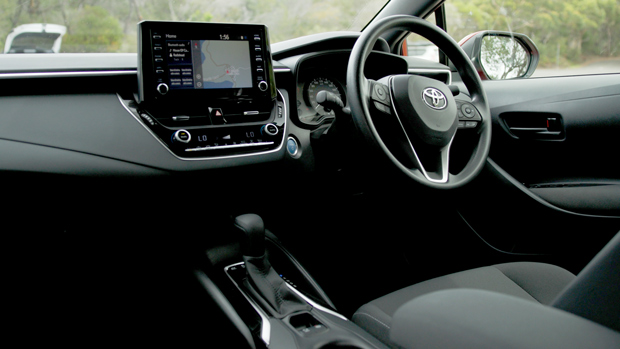
The Corolla’s tombstone-style front seats are tremendous. They’re cloth-appointed, so they stay cool on hot days, even if the textile used isn’t the highest quality. The pews offer a sporty and low driving position with manual up-down, fore-aft and backrest adjustment (but no height adjustment for the passenger) and ample bolstering to hold you in.
Door pockets are big enough for a 700mL bottle, while there are two well-sized cup holders and a central bin featuring a 12V socket under a cloth-upholstered armrest. Toyota has also included a deep tray head of the shifter that holds a phone safely with easy access to the single exposed USB-A charging port.
Plugging your smartphone into that port displays Apple CarPlay and Android Auto on the 8.0-inch touchscreen, and I found that to be ideal for mapping, navigation and playing music. It’s worth mentioning that some rivals, like the Hyundai i30, offer wireless smartphone mirroring in some grades.
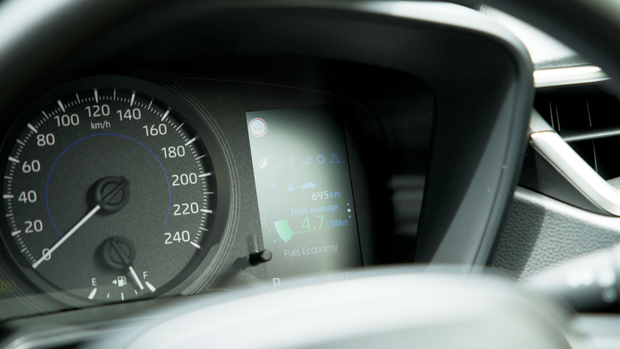
If you don’t mind using your smartphone for directions and music, and you don’t often find yourself without reception, then it’s worth saving the money on the navigation pack and getting your Ascent Sport Hybrid for $27,890 before on-roads.
That said, some people prefer built-in navigation, particularly if you occasionally drive to spots where phone reception is poor or non-existent. The $1000 navigation pack brings built-in GPS mapping and DAB radio, but also tinted rear windows that would be great to keep the sun away from young-ones faces. There are Isofix points on both outboard rear seats, though the rear windows are small and there are no adjustable air vents either.
That’s not to say the second row is off-limits for adults. If you’re less than six-foot all there is enough knee and headroom to be comfortable and a sturdy centre armrest, but the view out is compromised and the raised middle seat means the Corolla is best capped at four passengers.
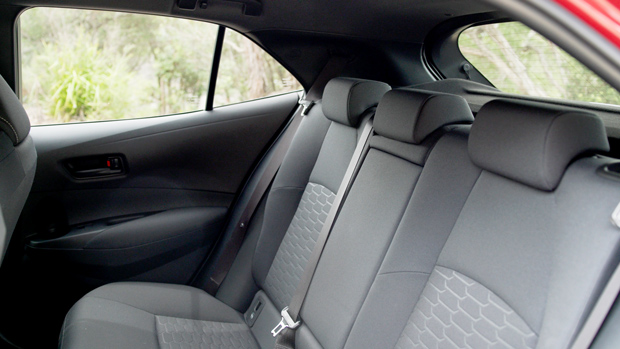
And finally the scourge of the Corolla hatch since its launch, the tiny 217 litre boot fits just 22 Chasing Cars soccer balls. For reference, most rivals like the Volkswagen Golf (380 litres) and Honda Civic (404 litres) offer nearly twice the volume.
Though if you need more luggage capacity, there’s always the Corolla sedan with 470 litres of space. The Ascent Sport hybrid hatch does have a space-saver spare tyre to help you get out of a bind and the boot is finished with fairly soft carpet.
If you’re not convinced by the relaxed acceleration of the Ascent Sport hybrid, then you might want to read the running costs section closely before choosing the standard petrol engine. Although the petrol-electric powertrain adds $2000 over the 2.0-litre combustion engine, it does save you money in the long run… just.
Assuming over five years the Ascent Sport hybrid travels 75,000km fuelled on E10 unleaded petrol in Sydney ($1.58/litre) and achieves its claimed 4.2L/100km consumption figure, you’ll save $2133 in fuel bills over the 6.0L/100km petrol-only Corolla, meaning you’re $133 better off.
That might not sound like much, but the hybrid really impresses with its consistently low fuel consumption. In our test it never climbed above 4.7L/100km even in stop-start environments, where a petrol Corolla uses 7.5-8L/100km in real-world testing.
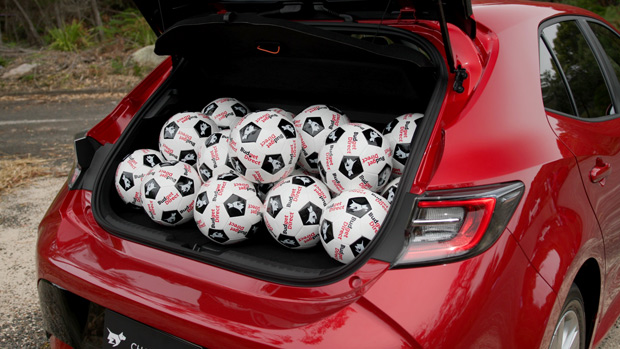
You may be interested in taking into account the lower pollution created by the Corolla hybrid, which emits 40 percent less CO2 (97g/km vs 148g/km) into the atmosphere.
A battery electric vehicle would be even better for the green-minded, but until one lands in this sub-$30K price bracket with a roving range close to the Corolla’s 900km, a hybrid like the Corolla still looks like a tantalising proposition as you don’t have to change your driving habits.
Servicing is the same for all Toyota Corollas, with a trip to the dealer required every 12 months or 15,000km at a cost of $205 per annum, for a five-year/75,000km total cost of $1025. Toyota covers all its cars in Australia with a five-year/unlimited kilometre warranty.
Is the base Ascent Sport grade the best Corolla you can buy? In hybrid form, this small car’s consistently low fuel consumption and silent low-speed operation certainly make it a very easy-going urban runabout.
The plush suspension and generous 55-series tyres fitted to 16-inch alloy wheels are great too, and there’s more than enough technology in the cabin to keep you satisfied, even if it isn’t a tech-fest like the new Volkswagen Golf.
Ultimately, although the seats are comfy, there is room for improvement in cabin materials, but if you’re someone that cares about that, then stepping up to the $30,795 (before on-road costs) SX hybrid isn’t a huge cash leap and addresses some of the scratchy plastics inside the cabin.
The current-gen Corolla has real flair to it – but it can also be one of those cars that simply fades into everyday life. Keen drivers can extract fun from the chassis, but most importantly, the 2022 Toyota Corolla hybrid is simply a cheap to run car that’s really comfortable and easy to get along with that almost certainly won’t break down. For us, that means the Corolla is fit-for-purpose.
Variant tested ASCENT SPORT HYBRID
Key specs (as tested)
About Chasing cars
Chasing Cars reviews are 100% independent.
Because we are powered by Budget Direct Insurance, we don’t receive advertising or sales revenue from car manufacturers.
We’re truly independent – giving you Australia’s best car reviews.
The estimate provided does not take into account your personal circumstances but is intended to give a general indication of the cost of insurance, in order to obtain a complete quote, please visit www.budgetdirect.com.au. Estimate includes 15%^ online discount.
^Conditions Apply
Budget Direct Insurance arranged by Auto & General Services Pty Ltd ACN 003 617 909(AGS) AFSL 241 411, for and on behalf of the insurer, Auto & General Insurance Company Limited(ABN 42 111 586 353, AFSL 285 571).Because we don’t know your financial needs, we can’t advise you if this insurance will suit you. You should consider your needs and the Product Disclosure Statement before making a decision to buy insurance. Terms and conditions apply.
Indicative quote based on assumptions including postcode , 40 year old male with no offences, licence suspensions or claims in the last 5 years, a NCD Rating 1 and no younger drivers listed. White car, driven up to 10,000kms a year, unfinanced, with no modifications, factory options and/or non-standard accessories, private use only and garaged at night.
^Online Discounts Terms & Conditions
1. Discounts apply to the premium paid for a new Budget Direct Gold Comprehensive Car Insurance, Third Party Property Only or Third Party Property, Fire & Theft Insurance policy initiated online on or after 29 March 2017. Discounts do not apply to optional Roadside Assistance.
2. Discounts do not apply to any renewal offer of insurance.
3. Discounts only apply to the insurance portion of the premium. Discounts are applied before government charges, taxes, levies and fees, including instalment processing fees (as applicable). The full extent of discounts may therefore be impacted.
4. We reserve the right to change the offer without notice.